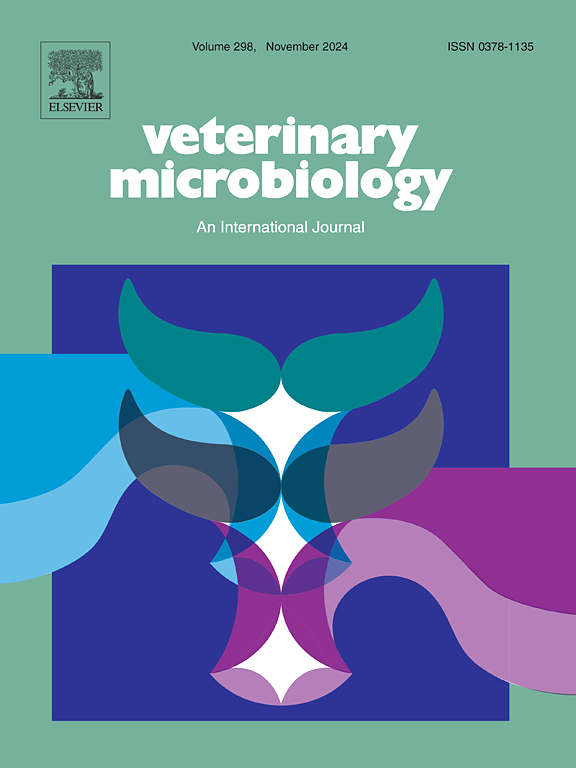IFN-mediated lncRNA-ISL promotes SVV infection through G1P3
IF 2.4
2区 农林科学
Q3 MICROBIOLOGY
引用次数: 0
Abstract
lncRNAs play important regulatory roles in almost every aspect of physiological processes. However, the mechanisms by which animal-encoded lncRNAs regulate the interaction of viral infection with host antiviral immunity are unknown. To explore the mechanisms of lncRNA regulation of SVV infection and interferon responses. We performed complete transcriptome sequencing analysis of porcine kidney 15 (PK-15) after infection with SVV-1 strain and IFN-α treatment, and identified and screened the sequencing data to obtain potential functional lncRNA-ISL. selected genes were knocked down using CRISPR/Cas9 guide RNAs (gRNAs), and the results of the sequencing were monitored by qRT-PCR and protein blotting in multiple cell lines for selected gene mRNAs and their proteins as well as SVV infection. The results showed that 68 lncRNAs were significantly altered by IFN-α and 176 lncRNAs were significantly altered after SVV infection. We found that lncRNA-ISL gRNA significantly inhibited SVV infection compared to negative gRNA control. The expression of the antiviral ISG G1P3 was significantly increased following lncRNA-ISL gRNA editing compared to negative gRNA control in SVV-infected PK-15 cells. We observed that lncRNA-ISL regulation of SVV was independent of JAK-STAT signaling and not associated with G1P3 DNA methylation. Finally, we confirmed that the regulatory effect of lncRNA-ISL on G1P3 occurs during the initial transcription.
ifn介导的lncRNA-ISL通过G1P3促进SVV感染。
lncrna几乎在生理过程的各个方面都发挥着重要的调节作用。然而,动物编码lncrna调节病毒感染与宿主抗病毒免疫相互作用的机制尚不清楚。探讨lncRNA调控SVV感染及干扰素应答的机制。我们对感染SVV-1株和IFN-α处理后的猪肾15 (PK-15)进行了完整的转录组测序分析,并对测序数据进行了鉴定和筛选,获得了潜在的功能性lncRNA-ISL。利用CRISPR/Cas9引导rna (gRNAs)敲低所选基因,在多个细胞系中采用qRT-PCR和蛋白印迹检测所选基因mrna及其蛋白的测序结果以及SVV感染情况。结果显示,68个lncrna被IFN-α显著改变,176个lncrna在SVV感染后显著改变。我们发现与阴性gRNA对照相比,lncRNA-ISL gRNA显著抑制SVV感染。在svv感染的PK-15细胞中,与gRNA阴性对照相比,lncRNA-ISL gRNA编辑后,抗病毒ISG G1P3的表达显著增加。我们观察到lncRNA-ISL对SVV的调控独立于JAK-STAT信号,与G1P3 DNA甲基化无关。最后,我们证实lncRNA-ISL对G1P3的调控作用发生在初始转录过程中。
本文章由计算机程序翻译,如有差异,请以英文原文为准。
求助全文
约1分钟内获得全文
求助全文
来源期刊

Veterinary microbiology
农林科学-兽医学
CiteScore
5.90
自引率
6.10%
发文量
221
审稿时长
52 days
期刊介绍:
Veterinary Microbiology is concerned with microbial (bacterial, fungal, viral) diseases of domesticated vertebrate animals (livestock, companion animals, fur-bearing animals, game, poultry, fish) that supply food, other useful products or companionship. In addition, Microbial diseases of wild animals living in captivity, or as members of the feral fauna will also be considered if the infections are of interest because of their interrelation with humans (zoonoses) and/or domestic animals. Studies of antimicrobial resistance are also included, provided that the results represent a substantial advance in knowledge. Authors are strongly encouraged to read - prior to submission - the Editorials (''Scope or cope'' and ''Scope or cope II'') published previously in the journal. The Editors reserve the right to suggest submission to another journal for those papers which they feel would be more appropriate for consideration by that journal.
Original research papers of high quality and novelty on aspects of control, host response, molecular biology, pathogenesis, prevention, and treatment of microbial diseases of animals are published. Papers dealing primarily with immunology, epidemiology, molecular biology and antiviral or microbial agents will only be considered if they demonstrate a clear impact on a disease. Papers focusing solely on diagnostic techniques (such as another PCR protocol or ELISA) will not be published - focus should be on a microorganism and not on a particular technique. Papers only reporting microbial sequences, transcriptomics data, or proteomics data will not be considered unless the results represent a substantial advance in knowledge.
Drug trial papers will be considered if they have general application or significance. Papers on the identification of microorganisms will also be considered, but detailed taxonomic studies do not fall within the scope of the journal. Case reports will not be published, unless they have general application or contain novel aspects. Papers of geographically limited interest, which repeat what had been established elsewhere will not be considered. The readership of the journal is global.
 求助内容:
求助内容: 应助结果提醒方式:
应助结果提醒方式:


